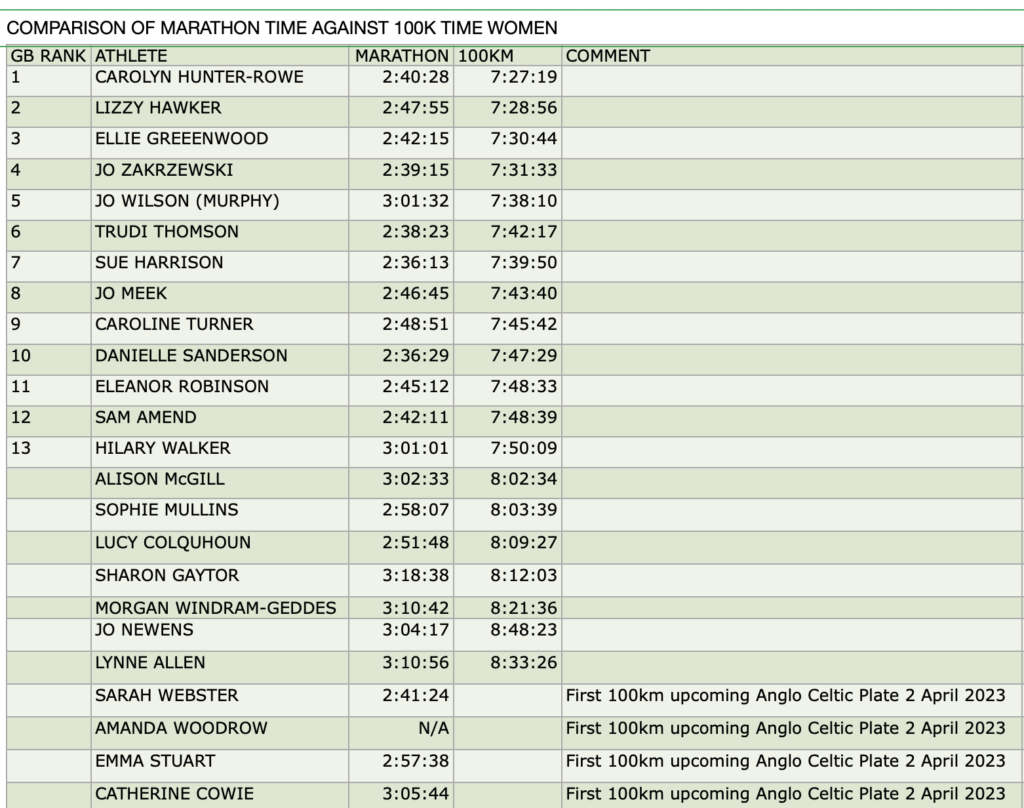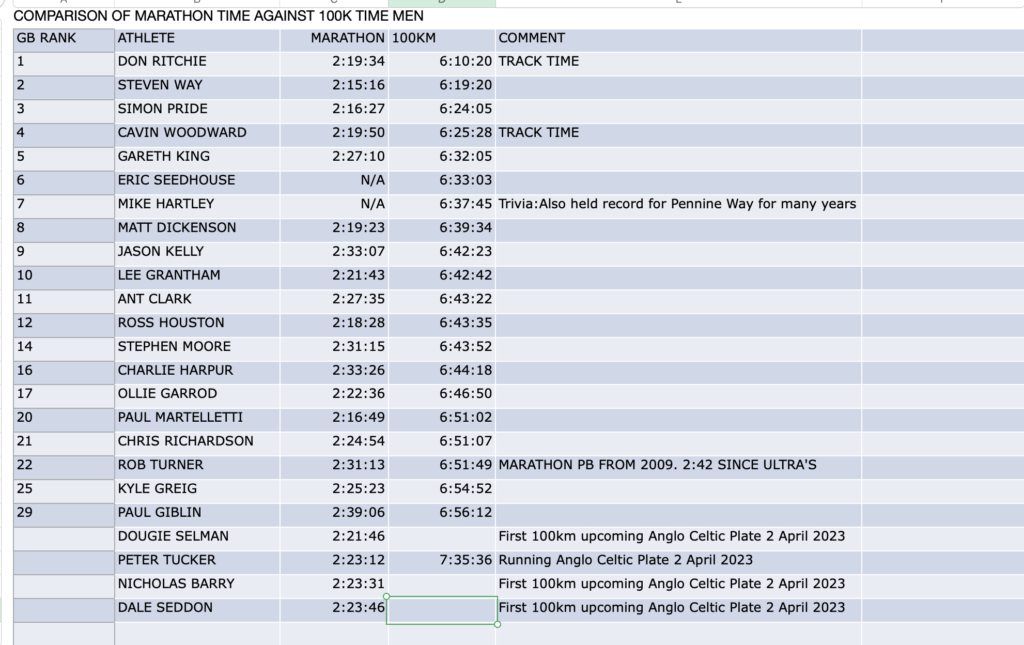Can your marathon time help predict your 100km time?
An issue for many runners who have ever thought about trying a road 100km is, could you predict your 100km time ?
Athletes and coaches will try and predict marathon times from half-marathon times. They will, just as importantly, look at recent training logs.
Can you predict YOUR 100km time?
Sorry, this post is NOT a definitive peer-researched study that will make you predict, with foolproof 110% accuracy, your 100k time.
IT WILL make anyone think, could I run a respectable 100k race for my ability? The answer to this is a resounding yes! As long as you have that initial inner motivation to sustain you, commit to the training, and any training block goes well. Although the times mentioned are at the elite end, the principle thinking will apply to any level of runner.
All I have done here is compile a comparison of the top all-time ranked GB 100k runners and their marathon times while making a few observations.
I have also listed a few runners running their first 100k at the ACP Home Countries International in April. If you like doing this, you can play “Fantasy athletics” and try and predict their times.
Marathon and 100km predictions
Tim Noakes, the author of The Lore of Running, has a theory. If you multiply your half-marathon time (in minutes) by 2.11, you get your predicted marathon time (in minutes). Another study suggests taking your average minutes per mile, adding 20 seconds and multiplying by 26.2.
I am sure in this age of ever-increasing sports science, many studies by professors, coaches and students have helped devise an easy-to-understand formula.
Similar formulas have been put forward for 100km. However, as the distance increases, there are, in my experience, too many variables to make predictions that sit nicely in tables and formulas.
Those possible variables include wind and temperature, nutrition, the severity of the course, the strength of competition and personal experience.
Comparing the top GB Women and some newcomers.

Study from top runners in GB rankings and random others.
Table complied by Adrian Stott from Power of Ten information
The top 13 are the current all-time British 100km rankings. Below are a couple of outliers and some recent and upcoming 100k runners that have come on my radar.
A few things to ponder in trying to predict your 100km time?
The fastest marathon times do not always translate to the fastest 100km times though most do have credible marks to their name. However, if you were to look at their form around the time of their best 100km performances, you would see most had a constant few years of consistent quality racing and training. This training enabled each runner to learn, through experience, not how to RUN an ultra but RACE an ultra event.
It is a verifiable fact that the top thirteen, apart from Sam Amend’s time, were achieved in a world or European championship event. In most cases, individual or team podium medals were at stake. Hunter-Rowe, Hawker and Greenwood managed to hold off strong opposition to strike gold, indicating competition is a factor in performance motivation.
Amends time was in a British championship.
Current GB Champion Jo Wilson is a slight outlier with Hilary Walker. Of all the women who have run 7 hrs 50 or less, these are the only two who haven’t broken 3 hours for the marathon. In Wilson’s case, it is because she hasn’t targeted a marathon specifically in her current spell of excellent ultra performances. However, this may change with her current training block culminating in the Seville marathon at the end of February.
In Walker’s case, she says she never had the natural speed of others. Most of her marathons were in training blocks for ultra races with little or no taper.
Predicting Mens 100km times
mens 100km times v marathon

Study from top runners in GB rankings and random others.
Table complied by Adrian Stott from Power of Ten information
Like the women, most of the fastest 100-kilometre times were achieved in championships. Like the marathon, tactics may dictate how the race unfolds rather than the clock.
It is interesting that 2 of the fastest times, Ritchie’s and Woodward’s, were set on a track. See HERE for a report on Ritchie racing against Woodward.
It was not a championship. However, both events had ideal conditions and both athletes were brought up to “Race Hard”. Analysing splits of both runners, you can see they paid scant attention to even pacing and went out hard with the hope of hanging on, despite slowing in the later stages.
Matt Dickinson, Gareth King and Jason Kelly, who had the fastest men’s times in 2022, all ran relatively even splits in their best 100km races.
You can read more on the 2022 GB rankings HERE.
Kelly’s marathon time, like Jo Wilson’s, is due for revision when he chooses to focus on that for a few months.
King likewise, for although he set his PB in London last October, it was just only five weeks after running his GB leading, 6:32:05
Prepare well, know your body, and understand what realistic pace you can hold for several hours.
What conclusions can we draw on predicting your 100k time?
Are there any simple conclusions to draw and offer to someone either thinking of running or improving their 100km time? The main one is that anyone with a solid marathon endurance background, at any level, has the potential to run a 100km event. Only slight tweaks in training from your successful marathon schedule are required.
All predictions are estimates but can indicate a window of where your plans A, B and C should lie. As with a marathon, your ability to hold your estimated, optimal race pace in a long training run can give personal feedback on your realistic goals.
Prepare well, know your body, and understand what realistic pace you can hold for several hours.
PLEASE SHARE!
If you have enjoyed this post, do see our other ones HERE
If you are inspired by this or think someone else you know will be, please do what you have to do by sharing. You all know how these things work by now:-) You can also follow me on Twitter and Instagram @tarittweets
